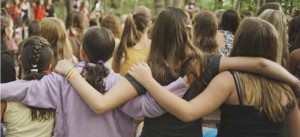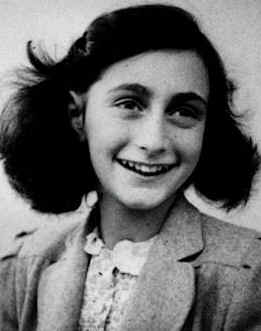Author Archives: Maya Zinkow
June 20, 2014 by Maya Zinkow
A Feminist Camp Counselor Unpacks Her Baggage

Photo credit: Foundation for Jewish Camp
Summer camp. For some kids, a yearly ritual that fills them with dread; for others, a place of infinite possibility. How can we bridge the gap between kids who were “born ready” for camp, and kids who feel marginalized there? Some camps institute a “no body talk” policy, so kids can relate to other (and to their own emerging identity struggles) in ways that are more than skin deep. Lilith intern Maya Zinkow, just out of Barnard and now a unit head at summer camp, has lots of ideas about how camp can be a more welcoming place for those kids who question everything–from gender norms to religious tradition.
The summer after my sophomore year at Barnard, I had just begun to crack open this thing called gender, hearing and welcoming the exciting voices that are part of the canon of a women’s college curriculum . I learned a new language, that of Virginia Woolf and Betty Friedan, Judith Butler and Alice Walker, and became more fluent with every class discussion, every conversation with friends over potluck dinners of quinoa, Brussels sprouts bathed in balsamic vinegar, and vegan desserts. The glossy Barnard brochures had assured me that I would become the women I saw in the pictures: confident, well-read, transformed. Finally, after two years, it was beginning to happen.
- 2 Comments
May 1, 2014 by Maya Zinkow
Protecting Anne Frank
 I’ve never been able to keep a diary. When I was young, I often tried over and over again; I made New Year’s resolutions to write every day, bought beautifully decorated journals, kept pens on my bedside table in the hope that they would remind me to jot down my thoughts just before sleep. I always had a penchant for writing, but there was something about the commitment to a notebook, something about being accountable to an object that always kept me from harnessing a routine.
I’ve never been able to keep a diary. When I was young, I often tried over and over again; I made New Year’s resolutions to write every day, bought beautifully decorated journals, kept pens on my bedside table in the hope that they would remind me to jot down my thoughts just before sleep. I always had a penchant for writing, but there was something about the commitment to a notebook, something about being accountable to an object that always kept me from harnessing a routine.
In eighth grade, we were assigned to read The Diary of Anne Frank, a ritual for most (if not all) American children. I was eager to delve into the mind of the girl who, for me, had become the face of the Shoah, that famous photo – eyes looking upward, thick hair perfectly pinned, a hopeful smile spread across her face – forever imprinted in my memory. I read hungrily, turning each page with an expectation to find something extraordinary, something that I was not expecting.
While undeniably astute for her age, I recall my disappointment and discomfort in the realization that this girl was just like me. She had a crush, she had fears, she had questions about growing up, she had problems with her mother. When we discussed the book in class, I felt panicked; as the only Jew in my class, it suddenly felt as if my classmates were reading my diary, were reading my personal thoughts and fears and talking about what themes they found in my writing, what interesting tidbits stood out. But it isn’t meant to be read like this, I thought. This is her diary. I felt invasive, sad, and protective of this girl who had lived in a different place and a different time. This girl whose thoughts had become America’s gateway into Holocaust education.
- 1 Comment
 Please wait...
Please wait...